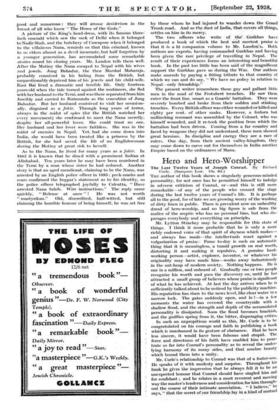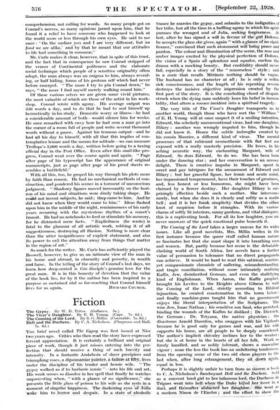Hero and Hero-Worshipper
Tan author of this book shpws a singularly generous-minded personality, for not once has he permitted himself to indulge in adverse criticism of Conrad, or—and this is still more remarkable—of any of the people who crossed the stage during the last twelve years of Conrad's life. It is perhaps all to the good, for of late we are growing weary of the washing of dirty linen in public. There is prevalent now an unhealthy dread of hero-worship, and no big figure is safe from the malice of the sceptic who has no personal bias, but who dis- parages everybody and everything on principle.
Mr. Lytton Strachey may be responsible for this state of things. I think it more probable that he is only a more richly endowed voice of that spirit of shyness which makes— and always has made—the intellectuals react against a vulgarization of praise.- Fame to-day is such an automatic thing that it is meaningless, a tumid growth on real worth, distorting it and making it repulsive. A genuine hard- working person—artist, explorer, inventor, or whatever his originality may have made him—works away industriously in the ant-heap of modern society. Nothing happens. He is one in a million, and unheard of. Gradually one or two people recognize his worth and pass the discovery on, until he has attracted a small group of believers whose praise is significant of what he has achieved. At last the day arrives when he is sufficiently talked about to,be noticed by the publicity machine. His reputation has risen to the news level, like clear water in a narrow lock. The gates suddenly open, and lo 1—in a few moments the water has covered the countryside with a shallow flood, and the strength and depth of the accumulated personality is dissipated. Soon the flood becomes brackish, and the gadflies spring from it, the bitter, disparaging critics. , In such an unpropitious world as this, Mr. Curie is to be congratulated on his courage and faith in publishing a book which is unashamed in its gesture of obeisance. Had he been less sincere, it would have been fulsome and stupid. The force and directness of his faith have enabled him to pene- trate so far into Conrad's personality as to reveal the under- lying harmony of its many sides, and that sombre beauty which bound them into a unity. Mr. Curie's relationship to Conrad was that of a foster-son. He speaks of it with modesty and surprise. Throughout his book he gives the impression that he always felt it to be an unexpected honour that Conrad should have singled him out for confidant ; and he relates in a most reverent and moving way the master's tenderness and consideration for him through- out the course of their intimate association. "I believe," he says, "that the secret of our friendshiplay in a kind of mutual comprehension, not calling for words. So many people got on Conrad's nerves, so many opinions jarred upon him, that he found it a relief to have someone who happened to look at the world more or less through his own eyes. He said to me once : On the surface you and I are Very different-, but -au fond we are alike,' and by that he meant that our attitudes to life had something in common."
Mr. C'urle makes it clear, however, that in spite of this trust, and the fact that in consequence he saw Conrad stripped of the veneer of Continental politeness and the elaborate social technique which people of a sensitive originality often adopt, the man always was an enigma to him, always reveal- ing, or half hiding, forms of his protean self which had never before emerged. "The more I try to pin Conrad down," he says, "the more I find myself merely walking round him."
Of these various selves we are given some vivid pictures, the most valuable of which are those of the artist in his work- shop. Conrad wrote with agony. His average output was 350 words a day, and to do that he had to seal himself up hermetically in his study. Domestic worry or illness—he had a considerable amount of both—would silence him for weeks. He once remarked with envy how he had seen a man go into the corner of a room full of people and write several thousand words without a pause. Against his tenuous output—and he had all his day to himself, with all that this implies of con- templative leisure and the means for solitude—we can measure 'I`rollope's 3,000 words a day, written before going to a taxing official day in the Post Office. Even after this snail-like pro- gress, Conrad went over the course again and again. "Page after page of his typescript has the appearance of original manuscripts, just as page after page of his proof sheets re- sembles a battlefield." • With all this, too, he groped his way through his plots more by faith than reason. He had no mechanical methods of con- struction, and pondered his scenes in a torment of unconscious judgment. "Shadowy figures moved incessantly on the hori- zon of his mind and situations were dimly taking shape. He cod not invent subjects, he said ; thep came to him. And he did not know when they would come to him." Ideas flashed upon him in the middle of the night, reminiscences of his early years recurring with the mysterious rhythm of a comet's transit. He had no notebooks to feed or stimulate his memory, for he distrusted mere facts. "Explicitness (he wrote) is fatal to the glamour of all artistic work, robbing it of all suggestiveness, destroying all illusion. Nothing is more clear than the utter insignificance of explicit statement, and also its power to call the attention away from things that matter in the region of art."
So much for the writer. Mr. Curie has sufficiently played the Boswell, however, to give us an intimate view of the man in his home and abroad, in obscurity and poverty, in wealth and fame, In the telling of the story of Conrad's last days, we learn: how deep-seated is this disciple's genuine love for the great man. It is in this honesty of devotion that the value of the book lies, for by it the author has been inspired to a purpose so sustained atid so far-reaching that Conrad himself







































 Previous page
Previous page